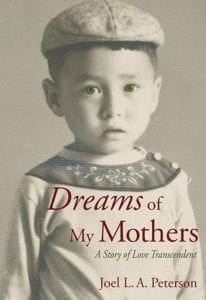
Shelf Unbound: Tell us about the two mothers in this novel.
Joel L.A. Peterson: I wrote Dreams of My Mothers to tell a remarkable story of the journey of two women—mothers—from the polar opposites of life; to share the story of their courage, sacrifice, and dreams. I have been privileged to bear witness to the lives of these amazing women, as well as some very unique circumstances and experiences, at extreme ends of the human condition and at the margins of the American saga.
One mother is a young, destitute peasant woman in the 1960s who is struggling to raise her illegitimate infant, the son of an American GI, in an under-developed South Korea, barely recovering from a brutal civil war. She struggles with her pain from the abandonment by her son’s father and the shame of her poverty-driven prostitution.
Her infant son nearly loses his life in a tragic, horrific accident, making him not only illegitimate, poor, and foreign, but also crippled and disfigured—all the more ostracized and without hope. She wonders what future can there be for her and her son—a desperate, marginalized woman and a stateless, fatherless, racially mixed, crippled boy.
In America, a different young mother—a classic blonde-haired and blue-eyed Midwestern All-American—gives birth prematurely to a son, with tragic results, leaving her soul and her faith shattered—and questioning all her beliefs. Years later, despite having four beautiful children of her own, she has never forgotten her lost son and is still silently dealing with her pain and anger at her God until she reads an appeal in a magazine article: a call to those who have love enough to save children—from the other side of the planet—who are without a future and without hope.
In the tragedies and triumphs of two mothers from the opposite ends of the world is born a dream and a destiny that must overcome prejudice, racism, ignorance, and individual limitations. This novel is the ultimate story of identity, race, and family, bound up within the dreams, redemption, and love of two women.
Shelf Unbound: The boy in the story is marginalized in a number of ways—he is biracial, he has physical disabilities. What about him enabled him to persevere?
Peterson: The boy inherited a resilience from his birthmother and felt duty bound to succeed so that her sacrifice of giving him up would not be for nothing. And he never doubted the love that his birth mother had for him. He further benefited from the example and lessons that his adoptive parents set for him and passed on to him. Knowing too intimately well the depravation of the destitute, the powerless, and the impoverished, he fully appreciated the richness, blessings, and opportunity that his American family and society offered and worked to maximize every opportunity and open door. Add to that a God-given gift of intelligence and curiosity and an unwillingness to hate those who perpetuated ignorance and bigotry.
Shelf Unbound: This novel is partially based on your own life story. Why did you choose fiction over autobiography?
Peterson:We all have lives that are fascinating and interesting to ourselves, but very few of us have lives that interest others. My life story is probably no exception, but for having a few rare events and experiences that most others may not have. So I used these rare events and situations to create the stage for a story that we all may be engaged by and find fascinating.
We all have mothers, but few of us ever truly get to know them or understand them as the human person they are. Instead we too often only know them as the institution of “Mom.” I wanted to write a story that would allow the reader to get to know intimately two women who were mothers but also extraordinary humans—who had flaws and weaknesses, but nonetheless rose to successfully meet the highest challenges of their souls.
I could not have created this story of these women in a way that would be most compelling and relatable if written as an autobiography. I would instead have been guilty of the hubris to think that, owing to some particular events and circumstances of my life, a wide audience would find it engaging or inspirational. It is the story of the journeys of two women and their paths through tragedy, redemption, and triumph that appears to resonate with readers and offer a broader, more universal message of hope and inspiration.
